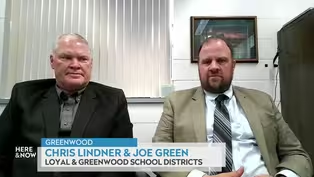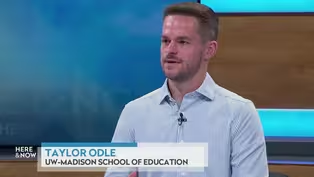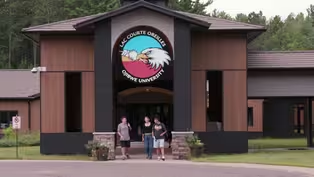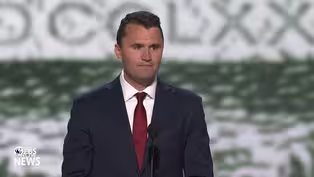Here and Now
Sheriff Roger Brandner on Shortages of Emergency Dispatchers
Clip: Season 2400 Episode 2410 | 5m 47sVideo has Closed Captions
Roger Brandner on retaining 911 dispatchers as they burn out from overtime and stress.
Columbia County Sheriff Roger Brandner discusses growing difficulty Wisconsin counties have in retaining emergency dispatch staff at 911 call centers as they burn out from overtime, stress and trauma.
Problems playing video? | Closed Captioning Feedback
Problems playing video? | Closed Captioning Feedback
Here and Now is a local public television program presented by PBS Wisconsin
Here and Now
Sheriff Roger Brandner on Shortages of Emergency Dispatchers
Clip: Season 2400 Episode 2410 | 5m 47sVideo has Closed Captions
Columbia County Sheriff Roger Brandner discusses growing difficulty Wisconsin counties have in retaining emergency dispatch staff at 911 call centers as they burn out from overtime, stress and trauma.
Problems playing video? | Closed Captioning Feedback
How to Watch Here and Now
Here and Now is available to stream on pbs.org and the free PBS App, available on iPhone, Apple TV, Android TV, Android smartphones, Amazon Fire TV, Amazon Fire Tablet, Roku, Samsung Smart TV, and Vizio.
Providing Support for PBS.org
Learn Moreabout PBS online sponsorshipLindner Local Schools, thanks very much.
Good luck.
>> Thank you.
Thank you.
>> A legislative hearing at the Capitol this week focused on staffing shortages in law enforcement, looking at county jurisdictions in particular.
of the emergency?
>> One place staffing shortages are being felt acutely across the state.
In 911 emergency call centers among dispatchers.
What has led to shortages and what can be done about it?
We turn to Columbia County Sheriff Roger the Capitol.
And Sheriff, thanks very much for being here.
>> You're welcome.
Glad to be here.
>> So describe the shortage of dispatchers in your county.
>> Yeah, I think we're consistent with the rest of the 901 PSAP dispatch centers across the state.
There's been a struggle to get qualified dispatchers in the door and get them trained in our county.
We're we're four short.
We've been 4 to 5 short for just over a year and a half, which puts a, you know, a great strain on the other dedicated dispatchers that are currently there.
>> Yeah, indeed.
Now, I read that the pay is between about 50 and $70,000 a year.
Why is it hard to fill a retain these positions?
Is it that the pay cannot make up for the stress of the job?
>> Well, I think it's a combination of both.
You know, most dispatchers around the area are going to be making around that 25, $26 an hour.
You know, which is not a bad paying job, but you're working nights, weekends, holidays.
It's not Monday through Friday shift work.
These are long hours.
Very stressful.
You know, if you taking that call from that mom whose young child is not breathing or from a car accident or a domestic, you know, or a sexual assault, there's a lot of stressful calls.
And these dispatchers are the ones that answer that call to get the first responders to that scene.
>> And and so with a shortage, in addition to, to that, they're working a lot of overtime hours.
>> Oh, absolutely.
I know dispatch centers across the state that have contracted with other dispatch centers.
I know one county where the sheriff is actually dispatching at night because they're so short.
Our dispatchers are working a lot of overtime.
It's nothing.
Nothing for them to work 20 extra hours in addition to their 40 hours a week.
>> What does a shortage of dispatchers mean for emergency response in your community and others?
>> Yeah, I mean, we've been able to backfill it with our dedicated men and women in our dispatch center.
But the fear across the state and in our county especially, is when they burn out and they leave and we get any shorter, we're going to struggle with having someone answer that call for service.
When someone calls for that, that immediate need of fire, EMS or law enforcement, you know, we need a proper, timely response.
We need a trained dispatcher to gather all the adequate information to get the right first responders there.
And if they're tired, if they're calling in sick, if we don't have the staff to to sit in that dispatch center, there's going to be a delay in first responder services, which is a public safety issue.
you is that as the lead law enforcement official in your county, to be worrying about emergency response times?
>> Oh, it's it's critical.
This has been our number one focus in our county for about the last year.
There's no question there's law enforcement officers that work the street, our jailers and our county jails.
Many county jails are not at full staff.
But our dispatch center.
I mean, they have to be there.
They have to answer that, that call for service.
They they just have to we have to have someone sitting in those chairs and there cannot be a delay.
Seconds truly make a difference when you're calling for assistance.
>> What are some of the solutions being looked at?
>> Well, our county specifically, we really did a an adjustment of pay.
We did some premium incentives for working at night and on weekends.
We have done some other financial type of incentives.
So if you're here a year, three years, five years, you get a bonus.
We have changed the hours.
One unique thing with us is we just consolidated the Wisconsin Dells Police Department's dispatch center, which, you know, was about $1 million project.
And we had to increase our space up there.
Our dispatch stations, the equipment, update them.
So that was a big project, you know, because Wisconsin Dells area is is busy in the summertime especially.
But, you know, actually all 12 months out of the year now.
So we've we've given them more help.
We've we've increased, you know, some of the the little things up there, as crazy as it sounds, we got them a treadmill.
We started some yoga classes here.
We do a lot of stress management with helping them cope with the stress of taking these calls.
Because our dispatchers work 12 hours a shift, and that's a long time to be sitting there, and they don't get the opportunity, like so many other workers, to get up and walk around, to move around, to leave the station and go get fresh air outside.
They have to stay close to that radio at any given second.
That any given second.
That
Here & Now opening for September 12, 2025
Video has Closed Captions
Clip: S2400 Ep2410 | 1m 17s | The introduction to the September 12, 2025 episode of Here & Now. (1m 17s)
Joe Green and Chris Linder on School District Consolidation
Video has Closed Captions
Clip: S2400 Ep2410 | 6m 44s | Joe Green and Chris Lindner on consolidating school districts due to falling enrollment. (6m 44s)
Taylor Odle on UW's Direct Admission Programs For Students
Video has Closed Captions
Clip: S2400 Ep2410 | 6m 26s | Taylor Odle on direct admission programs to the UW system for state high school students. (6m 26s)
Tribal Universities Prepare for Deep Cuts to Federal Funding
Video has Closed Captions
Clip: S2400 Ep2410 | 4m 41s | Lac Courtre Oreilles Ojibwe University faces funding cuts under a Trump budget proposal. (4m 41s)
Wisconsin Politicians Respond to Charlie Kirk Assassination
Video has Closed Captions
Clip: S2400 Ep2410 | 1m 10s | Wisconsin politicians share their reactions to the fatal shooting of Charlie Kirk in Utah. (1m 10s)
Providing Support for PBS.org
Learn Moreabout PBS online sponsorship
- News and Public Affairs

Top journalists deliver compelling original analysis of the hour's headlines.

- News and Public Affairs

FRONTLINE is investigative journalism that questions, explains and changes our world.












Support for PBS provided by:
Here and Now is a local public television program presented by PBS Wisconsin




